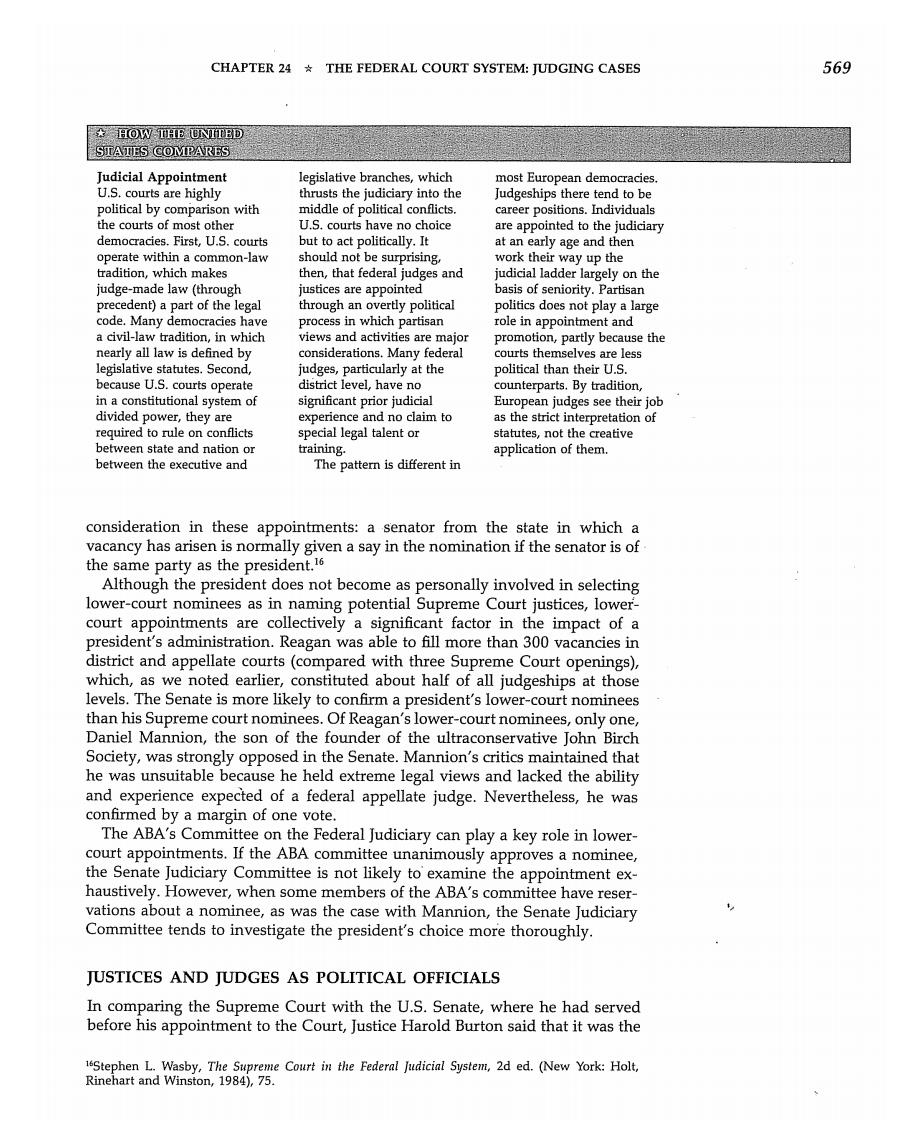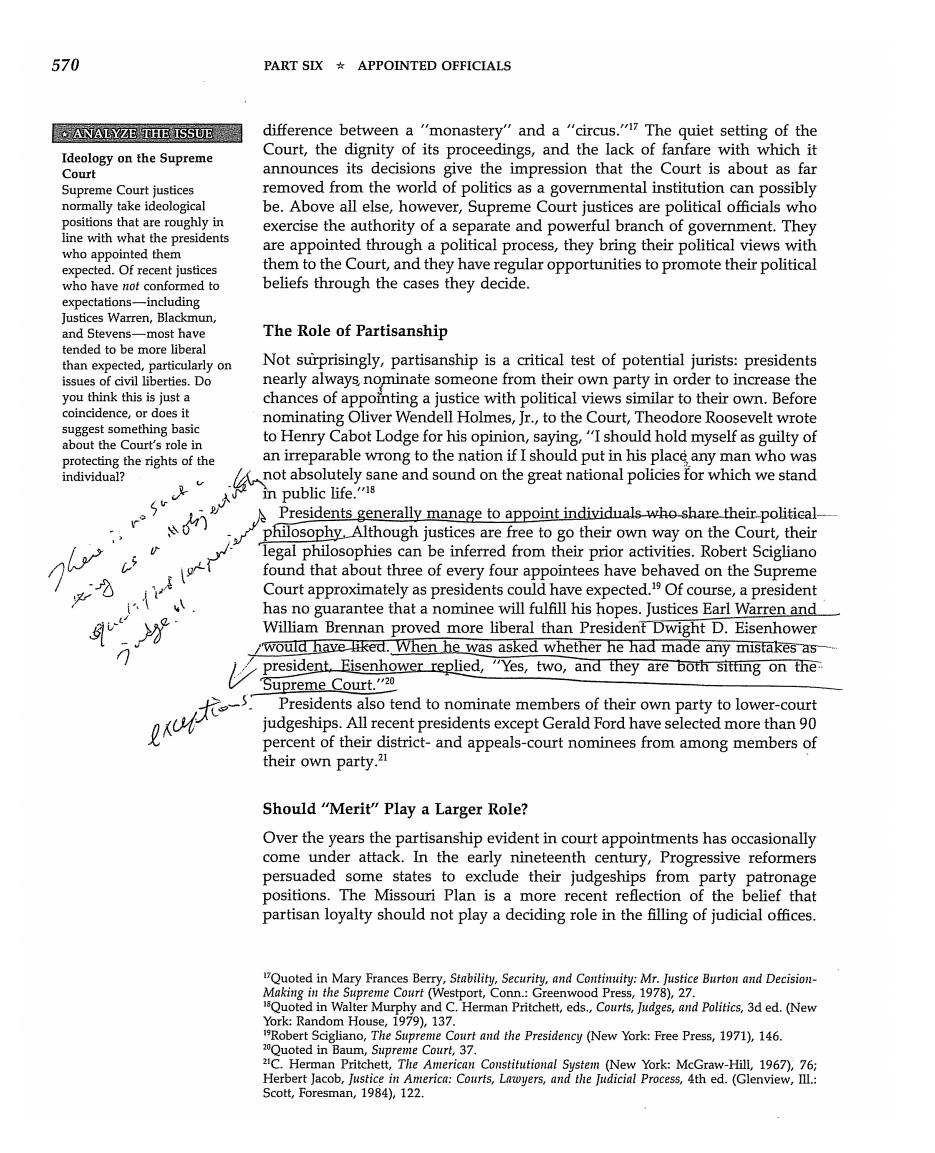
CHAPTER 24 THE FEDERAL COURT SYSTEM:JUDGING CASES 569 本百OWTE心NDED STATES COMPARES Judicial Appointment legislative branches,which most European democracies. U.S.courts are highly thrusts the judiciary into the Judgeships there tend to be political by comparison with middle of political conflicts. career positions.Individuals the courts of most other U.S.courts have no choice are appointed to the judiciary democracies.First,U.S.courts but to act politically.It at an early age and then operate within a common-law should not be surprising, work their way up the tradition,which makes then,that federal judges and judicial ladder largely on the judge-made law (through justices are appointed basis of seniority.Partisan precedent)a part of the legal through an overtly political politics does not play a large code.Many democracies have process in which partisan role in appointment and a civil-law tradition,in which views and activities are major promotion,partly because the nearly all law is defined by considerations.Many federal courts themselves are less legislative statutes.Second, judges,particularly at the political than their U.S. because U.S.courts operate district level,have no counterparts.By tradition, in a constitutional system of significant prior judicial European judges see their job divided power,they are experience and no claim to as the strict interpretation of required to rule on conflicts special legal talent or statutes,not the creative between state and nation or training. application of them. between the executive and The pattern is different in consideration in these appointments:a senator from the state in which a vacancy has arisen is normally given a say in the nomination if the senator is of the same party as the president.16 Although the president does not become as personally involved in selecting lower-court nominees as in naming potential Supreme Court justices,lower- court appointments are collectively a significant factor in the impact of a president's administration.Reagan was able to fill more than 300 vacancies in district and appellate courts(compared with three Supreme Court openings), which,as we noted earlier,constituted about half of all judgeships at those levels.The Senate is more likely to confirm a president's lower-court nominees than his Supreme court nominees.Of Reagan's lower-court nominees,only one, Daniel Mannion,the son of the founder of the ultraconservative John Birch Society,was strongly opposed in the Senate.Mannion's critics maintained that he was unsuitable because he held extreme legal views and lacked the ability and experience expected of a federal appellate judge.Nevertheless,he was confirmed by a margin of one vote. The ABA's Committee on the Federal Judiciary can play a key role in lower- court appointments.If the ABA committee unanimously approves a nominee, the Senate Judiciary Committee is not likely to examine the appointment ex- haustively.However,when some members of the ABA's committee have reser- vations about a nominee,as was the case with Mannion,the Senate Judiciary Committee tends to investigate the president's choice more thoroughly. JUSTICES AND JUDGES AS POLITICAL OFFICIALS In comparing the Supreme Court with the U.S.Senate,where he had served before his appointment to the Court,Justice Harold Burton said that it was the Stephen L.Wasby,The Supreme Court in the Federal Judicial System,2d ed.(New York:Holt, Rinehart and Winston,1984),75

570 PART SIX APPOINTED OFFICIALS ANALYZE THE ISSUE difference between a "monastery"and a "circus."17 The quiet setting of the Ideology on the Supreme Court,the dignity of its proceedings,and the lack of fanfare with which it Court announces its decisions give the impression that the Court is about as far Supreme Court justices removed from the world of politics as a governmental institution can possibly normally take ideological be.Above all else,however,Supreme Court justices are political officials who positions that are roughly in exercise the authority of a separate and powerful branch of government.They line with what the presidents who appointed them are appointed through a political process,they bring their political views with expected.Of recent justices them to the Court,and they have regular opportunities to promote their political who have not conformed to beliefs through the cases they decide. expectations-including Justices Warren,Blackmun, and Stevens-most have The Role of Partisanship tended to be more liberal than expected,particularly on Not surprisingly,partisanship is a critical test of potential jurists:presidents issues of civil liberties.Do nearly always nominate someone from their own party in order to increase the you think this is just a chances of appointing a justice with political views similar to their own.Before coincidence,or does it nominating Oliver Wendell Holmes,Jr.,to the Court,Theodore Roosevelt wrote suggest something basic about the Court's role in to Henry Cabot Lodge for his opinion,saying,"I should hold myself as guilty of protecting the rights of the an irreparable wrong to the nation if I should put in his place any man who was individual? ltely ne and sound on the great national policies for which we sta in public life."18 Presidents generally manage to appoint individuals who-share their political philosophy.Although justices are free to go their own way on the Court,their legal philosophies can be inferred from their prior activities.Robert Scigliano found that about three of every four appointees have behaved on the Supreme 必 Court approximately as presidents could have expected.19 Of course,a president has no guarantee that a nominee will fulfill his hopes.Justices Earl Warren and ブ9e. William Brennan proved more liberal than President Dwight D.Eisenhower would have liked.When he was asked whether he had made any mistakes as president,Eisenhower replied,"Yes,two,and they are both sitting on the Supreme Court."20 Presidents also tend to nominate members of their own party to lower-court judgeships.All recent presidents except Gerald Ford have selected more than 90 percent of their district-and appeals-court nominees from among members of their own party.21 Should "Merit"Play a Larger Role? Over the years the partisanship evident in court appointments has occasionally come under attack.In the early nineteenth century,Progressive reformers persuaded some states to exclude their judgeships from party patronage positions.The Missouri Plan is a more recent reflection of the belief that partisan loyalty should not play a deciding role in the filling of judicial offices. Quoted in Mary Frances Berry,Stability,Security,and Continuity:Mr.Justice Burton and Decision- Making in the Supreme Court(Westport,Conn.:Greenwood Press,1978),27. Quoted in Walter Murphy and C.Herman Pritchett,eds.,Courts,Judges,and Politics,3d ed.(New York:Random House,1979),137. Robert Scigliano,The Supreme Court and the Presidency (New York:Free Press,1971),146 2Quoted in Baum,Supreme Court,37. 2C.Herman Pritchett,The American Constitutional System (New York:McGraw-Hill,1967),76; Herbert Jacob,Justice in America:Courfs,Lnwyers,and the Judicial Process,4th ed.(Glenview,Il.: Scott,Foresman,1984),122